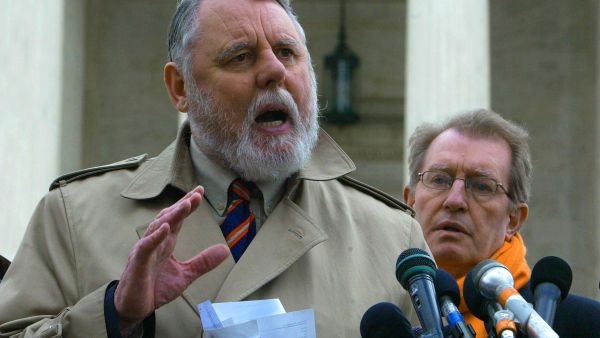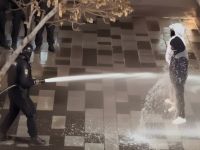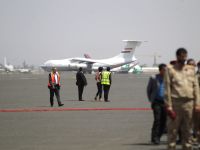When two masked gunmen sprung from a blacked-out vehicle and forced Kalev Kaosaar’s face into the dirt, he assumed he was being robbed.
“Very quickly, they collected our belongings. Then a white van came along. I thought at first it was a robbery and that they would take our belongings. But when they pushed us into the van, I understood,” he said.
It was only then that Kaosaar and his six fellow travelers realized they were becoming the victims of a kidnapping, not to mention the principal characters in one of the most extraordinary sagas of the year.
“They were shouting at us: ‘Quiet!’ and ‘Allahu Akbar.’ I thought that we’d just be killed, because the area [we were taken from] is bad. But they took us to a place and told us that they were peaceful and would not kill us. They even gave us sandwiches,” he said. “That’s how this period started.”
The “period” in question was the 112-day detention of seven Estonian cyclists kidnapped in Lebanon’s Bekaa Valley, in which the men were transported across the Syrian border, often made to go without food or showers, regularly teased with the promise of liberation and even occasionally in genuine fear for their lives.
In an interview with The Daily Star Monday, Kaosaar, 37, shed light on their capture, captivity and release, unearthing previously unheard details about the men’s ordeal.
The tourists were finally released from their four-month hell last Thursday, a journey that took them to the French Embassy in Beirut and finally back to grateful family and friends waiting at home in Tallinn.
Kaosaar described the day that many of the men feared would never come began.
“The day of the release … was quite interesting. We were awoken at 4 a.m. and I am not sure where we were, but it was a village in a quite problematic area [of Lebanon],” he said.
“They [the kidnappers] put us in an empty field and gave us a cell phone with an Estonian number on it. They told us that we could only make a call after sunrise.”
Although details on the men’s release are scarce, it has been suggested that the operation to retrieve the liberated captives was conducted without the knowledge of Lebanese authorities, something Kaosaar’s testimony appeared to corroborate.
“It’s strange, because it was not much different for us. [During] the second week [of captivity] they promised that they would release us very soon. Always, it was ‘tomorrow’ or ‘after tomorrow.’ We hoped that this would be the real time, but we didn’t seriously expect it,” Kaosaar added.
The Tallinn-based father of three described how his captors immediately took the men to Syria, where the group was held for roughly 40 days. They were taken briefly back to Lebanon, then to Syria, then finally back to Lebanon, where they were released.
“They told us [where they were taking us]. There were some big mountains and we located ourselves by looking at them,” he said. “[Moving us] wasn’t a problem for them; they weren’t bothered at all. It seems there is no government control in these areas.”
Kaosaar also provided details on the kidnappers themselves.
“They told us they were Sunnis and they seemed to be pretty radical. I don’t know if they are connected to Palestinian groups or other specific organizations. But for me, it seemed that they were not just bandits, but also connected with another group.”
“Some days we were treated pretty well, they even cooked pretty good food and came to talk to us about life outside Syria and Lebanon. We told them how things were in our world. But some days, our treatment was not very good. We weren’t allowed to talk or move.”
While Kaosaar described an atmosphere of monotony among the group, as well as a resolve between the seven not to splinter as a unit, he said doubts began to creep in as their detention lengthened.
“We did what we had to do. We did nothing. Most of the time we spent sleeping and carrying out duties such as washing dishes or bringing water from the well. We were always together, my friends and the kidnappers,” he said. “[The group] understood that we needed to keep good relations with one another in order to survive. We had a common enemy and we had to be close to each other. There were bad days for all of us, but when one guy was down, the others tried to keep him up. Somehow we made it.“Did we feel like we would not be released? Sometimes, yes. We all did at some point, even though they said we would be released. But after 80 days, personally, I thought I would never get to see home. Sometimes, I thought that one day the video might come where they killed one of us. If they killed one of us, they would still have six. They did tell us many times that they would not kill us, and all we could do was trust them, and now we are free,” Kaosaar added.
He admitted that the ordeal had fundamentally altered his outlook on life, although he insisted the abduction had not soured his view of religion or the people of the Levant.
“I can’t say that I am the same man who left home on March 15. I am sure I am different. There are a lot of things, psychologically, that have changed in me. After this kind of experience, you take a different look on life and what is important,” he said. “Also, my picture of the world is much wider. Why did we do this trip? It was to meet different people. Before I knew that Islam as a religion was not bad, but what we get from the media … we very often get bad reports. We wanted to do this trip to see other things. We met some really kind people.
“Afterward, I am still thinking that there is no bad religion, there are bad or good people. These kidnappers didn’t change my views toward Islam. But there are people using the religion as weapon, as an excuse to do something.”
Kaosaar said he needed time to get over the darkest 112 days of his life. “I want to go back to a normal life. I will try to re-establish my work [in intellectual property law],” he said. “I want to spend time with my family and I need some period of time to understand exactly what happened.”
By Patrick Galey








